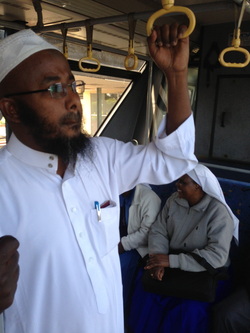
Arrival at Lilongwe was marvelous for so many reasons, not least of which was that I was completely "planed out" by the time I got there. The Kamuzi International Airport is nicely landscaped outside and has large welcome signs, visible from the tarmac, where we parked once again and took the steps down to another bus. The stairs were dry here, as we had crossed the equator into Winter and the dry season. I took this picture in the bus because I loved the juxtaposition of the Islamic man in thobe and kufi and the Catholic sisters in their habits. There was also a man with a yarmulke on the flight, but he was apparently unaware of my ecumenical photographic wishes, alas.
The bus let us off in a sort of open-air shelter with a tin roof; this was the place where the lines formed for Customs and Immigration. By chance, I was last in line. As I was about to step up to the next available booth for non-African Union Visitors, a policeman called me over into a side room. I have no idea why, as he was very friendly through the whole process. Maybe they heard about my run-in with the Italian carabinieri on another choral outing...?
The bus let us off in a sort of open-air shelter with a tin roof; this was the place where the lines formed for Customs and Immigration. By chance, I was last in line. As I was about to step up to the next available booth for non-African Union Visitors, a policeman called me over into a side room. I have no idea why, as he was very friendly through the whole process. Maybe they heard about my run-in with the Italian carabinieri on another choral outing...?
"How long are you here?"
"Three days."
"Only three days? Just passing through?"
"Well, yes. I am going to Mozambique, but I am spending two days in Lilongwe and one in Likoma before I head over."
"Mozambique, eh? What a shame. Only three days, and two in Lilongwe? Where in Lilongwe?"
Of course that would be the moment I blanked on the name - twenty-six hours of travel can do that, I suppose.
"I don't remember. To be honest, I was trying to get out my laptop to look it up."
"I will wait while you do that. I should be most interested to learn. In the meantime, let me take a most beautiful picture of you. And would you please press your fingers on this machine?"
This is the fingerprinting machine (proudly manufactured by 3M) that is all the rage in customs lines now. It wasn't working.
"Press harder, please."
It still wasn't working. A second policeman who had taken interest in the proceedings came over and began pressing my fingers onto the machine. Hard. It still wasn't working.
"These machines were made in China, you know," said the policeman in a teasing tone. "Not like the ones we used to get from America." "Pepani [Sorry]," I returned. This one word of ChiChewa sent everyone into gales of glee, and I learned a valuable lesson that was reinforced throughout the day: an effort to acknowledge that one is in Malawi by speaking ChiChewa is almost universally appreciated. After much more pressing for each hand and both thumbs and many more "Pepani. Eeeee. Pepani"s, I was on my way. My luggage inspection was then very easy, but running the gauntlet of taxi drivers was not.
After having consistent failures at every ATM machine and phone store at the airport, I gave up and found my taxi. One man grabbed a bag, a child opened the door, I said "Zikomo, [Thank you]" as he led me to the other side of the taxi (with British colonial history, they drive on the left here and I had forgotten), and we were off.
"Three days."
"Only three days? Just passing through?"
"Well, yes. I am going to Mozambique, but I am spending two days in Lilongwe and one in Likoma before I head over."
"Mozambique, eh? What a shame. Only three days, and two in Lilongwe? Where in Lilongwe?"
Of course that would be the moment I blanked on the name - twenty-six hours of travel can do that, I suppose.
"I don't remember. To be honest, I was trying to get out my laptop to look it up."
"I will wait while you do that. I should be most interested to learn. In the meantime, let me take a most beautiful picture of you. And would you please press your fingers on this machine?"
This is the fingerprinting machine (proudly manufactured by 3M) that is all the rage in customs lines now. It wasn't working.
"Press harder, please."
It still wasn't working. A second policeman who had taken interest in the proceedings came over and began pressing my fingers onto the machine. Hard. It still wasn't working.
"These machines were made in China, you know," said the policeman in a teasing tone. "Not like the ones we used to get from America." "Pepani [Sorry]," I returned. This one word of ChiChewa sent everyone into gales of glee, and I learned a valuable lesson that was reinforced throughout the day: an effort to acknowledge that one is in Malawi by speaking ChiChewa is almost universally appreciated. After much more pressing for each hand and both thumbs and many more "Pepani. Eeeee. Pepani"s, I was on my way. My luggage inspection was then very easy, but running the gauntlet of taxi drivers was not.
After having consistent failures at every ATM machine and phone store at the airport, I gave up and found my taxi. One man grabbed a bag, a child opened the door, I said "Zikomo, [Thank you]" as he led me to the other side of the taxi (with British colonial history, they drive on the left here and I had forgotten), and we were off.
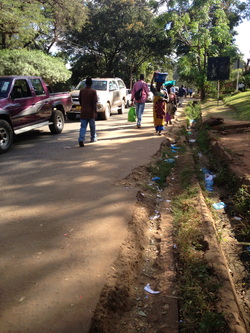
I wanted to write this extended first day entry, because I know my impressions will never be as fresh as they were today. How to describe that taxi ride? The taxi driver's name was Anthony. He made sure I knew it, and also that I knew his phone number. Driving people to and from the airport is quite profitable, with thirty-five US dollars being the going rate. Considering the average family income here is nine hundred dollars a year, it is little wonder that a taxi driver wants to get that return drive as well. We talked as we went, partly in ChiChewa (very little) and mostly in English. We were on a two-lane highway that was filled with as many bicycles as it was cars and trucks. Anthony was making those hair-raising split decisions that all city drivers make but that we only become aware of when they are different choices than we might make in our own country. On each side of the road was a dry, reddish dirt path on which people of all ages and descriptions were walking: students in uniforms just getting out of school and walking in small clumps (this was around 2 pm or so), women with masses of bananas or pails or bundles on their heads, a man with one tire around his neck and rolling another along the path, two men with giant pallets on their heads, mothers with babies wrapped in their zitenje [all purpose pieces of cloth women use for everything from skirt covers to baby carriers to load-on-head securers], just masses of people up and down a road that didn't appear to have anything on it to speak of - except for people.
"So, is this the main road to Lilongwe?"
Anthony's head snapped around. "The main road, yes. What, you have not been here before?"
"Oh, no." I said. "This is my first time in Malawi."
"Ahhh," he laughed. "Because my father told me when you got in, 'This man said Zikomo when I took his bag. I think he is Malawian!'"
We both had a good laugh over that, and from then on, whenever I said something in ChiChewa, it was enormously amusing to him. We stopped for mafuta [gasoline or oil] - because there is no meter and you agree on the rate beforehand, drivers my stop and do other things on the way. "Mafuta," I said. He laughed and repeated the word. We passed a new-ish looking factory where they processed tobacco. "Fodya," I said - a vocabulary word from Lesson One. "Eee, fodya." And so it went as we passed person after person, vehicle after vehicle, word after word - but very few actual places for mafuta or fodya. It was hard to see where everyone was going and why they were on the road at all.
"This town is very spread out, isn't it?"
"Eeee. Very scattered."
"So, is this the main road to Lilongwe?"
Anthony's head snapped around. "The main road, yes. What, you have not been here before?"
"Oh, no." I said. "This is my first time in Malawi."
"Ahhh," he laughed. "Because my father told me when you got in, 'This man said Zikomo when I took his bag. I think he is Malawian!'"
We both had a good laugh over that, and from then on, whenever I said something in ChiChewa, it was enormously amusing to him. We stopped for mafuta [gasoline or oil] - because there is no meter and you agree on the rate beforehand, drivers my stop and do other things on the way. "Mafuta," I said. He laughed and repeated the word. We passed a new-ish looking factory where they processed tobacco. "Fodya," I said - a vocabulary word from Lesson One. "Eee, fodya." And so it went as we passed person after person, vehicle after vehicle, word after word - but very few actual places for mafuta or fodya. It was hard to see where everyone was going and why they were on the road at all.
"This town is very spread out, isn't it?"
"Eeee. Very scattered."
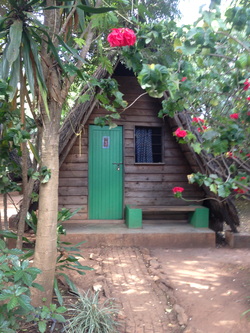
The exterior. Look at the blooming tree!
Eventually we reached an area that looked a little more like a city.
"So," Anthony continued later, "You like this place you are staying?"
"I don't know. It was recommended to me by someone who lives here. You don't like it?"
"You could do better. Too many English people, if you ask me. But... you have to start somewhere."
At that point, we turned onto a short street and stopped in front of a bright green barred gate with lizards painted on it. Anthony honked, and a head peered out from a square cut in the solid metal gate. Seeing me in the back, the guard opened the door, and there I was. Here is my two-day home in Lilongwe.
This place is a compound of sorts, with people in lodges such as myself, others in dormitories, and some in tents. There also appear to be workers who live here. There are also showers and bathrooms that are communal (but with toilets and sinks with running water!), with helpful comments posted in each one such as: "If the showers are cold, try another block."
"So," Anthony continued later, "You like this place you are staying?"
"I don't know. It was recommended to me by someone who lives here. You don't like it?"
"You could do better. Too many English people, if you ask me. But... you have to start somewhere."
At that point, we turned onto a short street and stopped in front of a bright green barred gate with lizards painted on it. Anthony honked, and a head peered out from a square cut in the solid metal gate. Seeing me in the back, the guard opened the door, and there I was. Here is my two-day home in Lilongwe.
This place is a compound of sorts, with people in lodges such as myself, others in dormitories, and some in tents. There also appear to be workers who live here. There are also showers and bathrooms that are communal (but with toilets and sinks with running water!), with helpful comments posted in each one such as: "If the showers are cold, try another block."
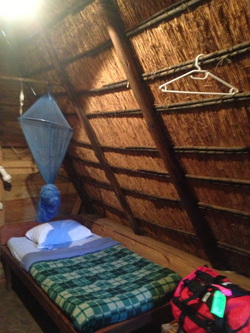
The small bed in the room. Mosquito net ready!
When I got here I knew I would have problems with access to phone and internet. Not every SIM card is available, and most companies here are pay-as-you-go. I asked the person working the desk in the afternoon where to go to get to the bank and to buy air time, and she gave me directions to "Old Town."
Mind you, Old Town is not particularly Old nor does it have any appearance of a well-established Town, but in Lilongwe it is distinguished by the fact that it has a name. You see, most parts of the city are organized under a rather sci-fi system. So it is that someone might live in Area 23 or Area 14. So, Old Town has some claim to fame in that regard (though it is also Area 4). Old Town is not far from where I am staying, so off I went.
Mind you, Old Town is not particularly Old nor does it have any appearance of a well-established Town, but in Lilongwe it is distinguished by the fact that it has a name. You see, most parts of the city are organized under a rather sci-fi system. So it is that someone might live in Area 23 or Area 14. So, Old Town has some claim to fame in that regard (though it is also Area 4). Old Town is not far from where I am staying, so off I went.
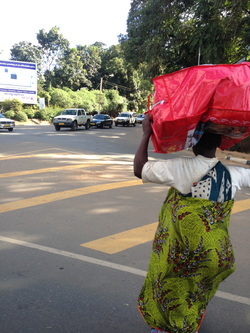
I don't know how to describe how wonderful that walk was - setting off in a totally foreign city where I was in a very obvious minority. I eventually found a bank that would dispense kwacha for me, and I bought my phone time the way one does in Lilongwe, from a woman by the side of the road sitting under a red Alltel umbrella. I went to the grocery store and bought water. I was approached by quite a few people from peddlers to beggars to students, and when I passed the open air market (which really had some incredible craftsmanship if only I had the room to pack any of it), cries of "Sir! Sir! Hello! Can I show you something?" filled the air. I found if I responded "Muli bwanji?[How are you?]," it unleashed the entire delightful social sequence that that opening mandates (very elaborate in Malawian culture), followed by smiles and thumbs up; and we could part ways in peace with no hard feelings.
Words and pictures cannot convey how alive the whole scene was. The traffic, the honking, the shouts, the markets, the farm stands by the side of the road (one older man had only three pumpkins to sell, a school child had gotten out of school only to set up a vegetable-turnover stand), the roosters crowing by the main police headquarters, women like the one pictured here negotiating busy rotaries at the height of afternoon traffic, a man who had to go and simply turned to a wall and urinated while people walked past unconcerned, a child guiding a blind old man in the middle of the traffic lanes in search of donations, the "minibuses" - a charitable term if there ever was one - packed to the gills with people and still stopping to let more on. I loved the totally bewildering, foreign and absolutely vital scene passing before me.
I also learned another important thing I will carry with me as I move forward: NO grown man here wears shorts, ever, unless he is a tourist. I sort of thought this from what I had read before I came, but it was confirmed today. They still have the old-fashioned system here that we once had in the United States: boys in short pants, young men (high school age and older) in long pants. Period. Indeed, many men had on winter jackets or sweatshirts. Maybe this is cold for a Malawian? It had to be in the 80s.... I was happy to see many men at least wearing short-sleeved shirts!
.....
Words and pictures cannot convey how alive the whole scene was. The traffic, the honking, the shouts, the markets, the farm stands by the side of the road (one older man had only three pumpkins to sell, a school child had gotten out of school only to set up a vegetable-turnover stand), the roosters crowing by the main police headquarters, women like the one pictured here negotiating busy rotaries at the height of afternoon traffic, a man who had to go and simply turned to a wall and urinated while people walked past unconcerned, a child guiding a blind old man in the middle of the traffic lanes in search of donations, the "minibuses" - a charitable term if there ever was one - packed to the gills with people and still stopping to let more on. I loved the totally bewildering, foreign and absolutely vital scene passing before me.
I also learned another important thing I will carry with me as I move forward: NO grown man here wears shorts, ever, unless he is a tourist. I sort of thought this from what I had read before I came, but it was confirmed today. They still have the old-fashioned system here that we once had in the United States: boys in short pants, young men (high school age and older) in long pants. Period. Indeed, many men had on winter jackets or sweatshirts. Maybe this is cold for a Malawian? It had to be in the 80s.... I was happy to see many men at least wearing short-sleeved shirts!
.....
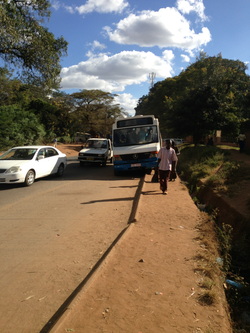
A bus driver, tired of traffic, creates his own lane, otherwise known as a sidewalk
A man on a bicycle hailed me from behind me as I was walking up the main road back to the lodge. Oh boy, I thought, here we go again. Sure enough, "Sir! I have an important matter to speak with you about!" Okay, l thought. "Muli bwanji?" Sure enough, he was startled, but he completed the sequence. This unexpected turn threw him off his plan, but he was persistent. After pedaling away slowly (perhaps to think about it), he circled around and came back. "My brother has a precious stone that is burdening him, and I was wondering if you or anyone you know would be willing to assist him with this?" Another biker came by and heard this, slowing down and looking back at me with a big grin to see if I would be silly enough to fall for this. "Pepani, abambo. I am afraid I have had problems of my own. The banks have not been giving me money because my cards don't work in most of them - " "Ah, I see. Then perhaps you know someone else who might help my brother with this difficult burden? I saw you in Old Town earlier and hoped you could help me." "I am sorry, but I am still too new to town to know many people. I am afraid I cannot help." "Ah yes. I understand. Pitani bwino. [Go well.]" "Pitani bwinonso." [You, too, go well]. How could you blame him for trying?
So it was that I came home, set up my internet, and typed up these posts while waiting to eat. Dinner is served at the lodge from 6 - 6:30 (!), and you must provide notice of what you are going to eat by 5:30, so that the chef will prepare exactly enough.
It is "Winter" here, but it was dark quite early even by Winter standards - by 6 in fact. We are on the eastern end of the time zone.
For dinner I ordered my plate of Malawian rice and beans - how could I not my first day here? For 1600 MK (about $4.20), I got a full plate of rice, beans, vegetables and peri peri sauce (hot sauce from peppers and garlic) that was outstanding and just right. It has been a very full day, with much to think about, and I know I will fall asleep musing on all I have seen and done,
and wondering if my mosquito net has any holes in it.
So it was that I came home, set up my internet, and typed up these posts while waiting to eat. Dinner is served at the lodge from 6 - 6:30 (!), and you must provide notice of what you are going to eat by 5:30, so that the chef will prepare exactly enough.
It is "Winter" here, but it was dark quite early even by Winter standards - by 6 in fact. We are on the eastern end of the time zone.
For dinner I ordered my plate of Malawian rice and beans - how could I not my first day here? For 1600 MK (about $4.20), I got a full plate of rice, beans, vegetables and peri peri sauce (hot sauce from peppers and garlic) that was outstanding and just right. It has been a very full day, with much to think about, and I know I will fall asleep musing on all I have seen and done,
and wondering if my mosquito net has any holes in it.
 RSS Feed
RSS Feed